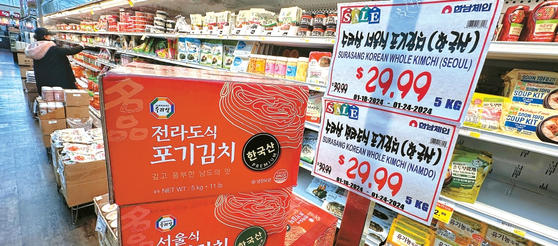Korean kimchi exports to the United States hit a record high last year.
According to data from the Agriculture and Trade LA office, the value of kimchi exports to the United States reached a record high of $40 million last year, up 37.4 percent from the previous year.
Annual kimchi exports to the U.S. surged 56 percent from $14.8 million in 2019 to $23 million in 2020. Since then, exports have steadily increased to $28.25 million in 2021 and $29 million in 2022.
Export volumes surged 66% in 2020 as demand for kimchi, a fermented food, increased after the pandemic due to the perception that it is a healthy food that boosts immunity. The export volume grew by 28.4% in 2021, then dropped to 7.8% in 2022, before rising again to 24.4% in 2023, reaching a record high of 10,000 tons.
The steady increase in kimchi exports to the U.S. was due to the Free Trade Agreement (FTA), which removed the 11.2% tariff on exported kimchi. Comparing USD 2.8 million in 2011, before the FTA came into effect, to USD 40 million last year, exports have increased 14 times in 12 years.

The K-food trend has been fueled by K-dramas and content, and kimchi has been recognized as a typical healthy K-food among other ethnicities. In fact, some Korean kimchi companies are labeling their packaging with “probiotic” to emphasize the fermented health benefits.
“The biggest reason for the steady increase in kimchi exports is the popularity of K-content,” said Minho Kim, head of aT’s Los Angeles office. “Price competitiveness due to government support for logistics and other costs, as well as the spread of awareness that kimchi is a healthy fermented food, have also contributed to the increase in exports.”
The rise in exports to the United States is being fueled by the widespread availability of Korean kimchis, like CJ Bibigo Kimchi, Daesang Jongga Kimchi, and Pulmuone, in major stores like Costco, Walmart, Ralphs, and Vons.
According to survey firm Quicktabs, Pulmuone is the top kimchi company in the U.S. market with 29 percent of the market share. According to Pulmuone USA, total sales of kimchi in the U.S. market reached $9.8 million last year, up 8% from the previous year.
“Kimchi sales are highest at Publix, Walmart, and other major retailers,” said Suk W. Kim, head of marketing at Pulmuone USA. “This year, we plan to further expand our existing vegan kimchi market and launch new white kimchi products.”
The rise of Korean kimchi exports to the U.S. is also reflected in kimchi sales in Southern California’s Korean supermarket industry.
According to the Korean supermarket industry, the percentage of kimchi in the kimchi section has been increasing year over year. At the end of 2022, Korean kimchi sales accounted for about 30% of total sales, and a year later, it has increased to more than 50%.
There are more than a dozen leading kimchi brands imported from Korea and sold in Korean markets, including CJ Bibigo Kimchi, Daesang Jongga Kimchi, and NongHyup Pungsan Kimchi, Dongwon Yangban, Hanmi Surasang, Wang, Hong Jin Kyung Kimchi, and Hwawon NongHyup Kimchi. Add to that the kimchi imported directly from Korea by Korean supermarkets, online markets, and small businesses, there are more than 20 brands of Korean kimchi available in Southern California. As the number of Korean kimchi imports grows, so does the competition for sales.
Galleria Market has been importing kimchi from Korea’s NongHyup since early last year, and sales have been increasing by about 5 percent each month.
“It’s been a year since we’ve been selling NongHyup kimchi directly, and sales are steadily increasing as regular customers accumulate,” said Jong Pil Hwang, manager of the Galleria Market’s grocery department. “There is a high level of trust in Korean ingredients and satisfaction with the taste of traditional Korean kimchi.”
BY EUNYOUNG LEE, JUNHAN PARK [lee.eunyoung6@koreadaily.com]




